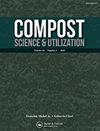Microbial Diversity in Compost is Critical in Suppressing Plant Fungal Pathogen Survival and Enhancing Cucumber Seedling Growth
IF 0.9
4区 农林科学
Q3 ECOLOGY
引用次数: 6
Abstract
ABSTRACT Compost is commonly used in agriculture to improve soil quality and enhance plant growth, which is considered to be related to microbial communities in compost. However, effects of microbial communities in compost on infecting microorganisms have remained underexplored. In this study, cucumber seedlings were grown in sterilized potting mix amended with sterilized straw composts inoculated with suspensions (4 dilution levels including 100, 10−3, 10−6, and 10−9) of the same compost that was not sterilized. Cucumber seedlings were challenged by a pathogenic F. oxysporum f. sp. radicis-cucumerinum. The microbial communities were evaluated by using a 16 S rRNA multiplex 454 pyrosequencing approach. In general, in the presence of F. oxysporum sp. radicis-cucumerinum, increasing dilution level increased disease severity index and decreased plant productivity. The logarithmic numbers of F. oxysporum sp. radicis-cucumerinum were significantly negatively correlated with the bacterial phylum and OTU (Operational taxonomic unit) richness in compost. The promotion of F. oxysporum sp. radicis-cucumerinum survival in compost with low microbial diversity, might be related to loss of antagonistic activity (as reflected by the copy numbers of the genes rhlB and hcnBC), which was caused by loss of microbial diversity in compost. In summary, microbial diversity in compost is critical in suppressing plant pathogen survival and then enhancing cucumber seedling growth.堆肥中的微生物多样性对抑制植物真菌病原体存活和促进黄瓜幼苗生长至关重要
摘要堆肥在农业中常用于改善土壤质量和促进植物生长,这被认为与堆肥中的微生物群落有关。然而,堆肥中微生物群落对感染微生物的影响尚未得到充分的研究。在这项研究中,黄瓜幼苗生长在用无菌稻草堆肥改良的无菌盆栽混合物中,用未灭菌的相同堆肥的悬浮液(4种稀释水平,包括100、10−3、10−6和10−9)接种。黄瓜幼苗受到病原性尖孢镰刀菌的攻击。通过使用16S rRNA多重454焦磷酸测序方法来评估微生物群落。一般来说,在尖孢镰刀菌(F.oxysporum sp.radicis cucuminum)存在的情况下,稀释水平的增加增加了疾病严重程度指数,降低了植物生产力。尖孢镰刀菌的对数与堆肥中的细菌门和OTU(操作分类单元)丰富度呈显著负相关。在微生物多样性较低的堆肥中,促进尖孢镰刀菌(F.oxysporum sp.radicis cucuminum)的存活可能与堆肥中微生物多样性的丧失引起的拮抗活性的丧失有关(如基因rhlB和hcnBC的拷贝数所反映)。总之,堆肥中的微生物多样性对于抑制植物病原体的存活,进而促进黄瓜幼苗的生长至关重要。
本文章由计算机程序翻译,如有差异,请以英文原文为准。
求助全文
约1分钟内获得全文
求助全文
来源期刊

Compost Science & Utilization
农林科学-生态学
CiteScore
4.10
自引率
0.00%
发文量
0
审稿时长
>36 weeks
期刊介绍:
4 issues per year
Compost Science & Utilization is currently abstracted/indexed in: CABI Agriculture & Environment Abstracts, CSA Biotechnology and Environmental Engineering Abstracts, EBSCOhost Abstracts, Elsevier Compendex and GEOBASE Abstracts, PubMed, ProQuest Science Abstracts, and Thomson Reuters Biological Abstracts and Science Citation Index
 求助内容:
求助内容: 应助结果提醒方式:
应助结果提醒方式:


